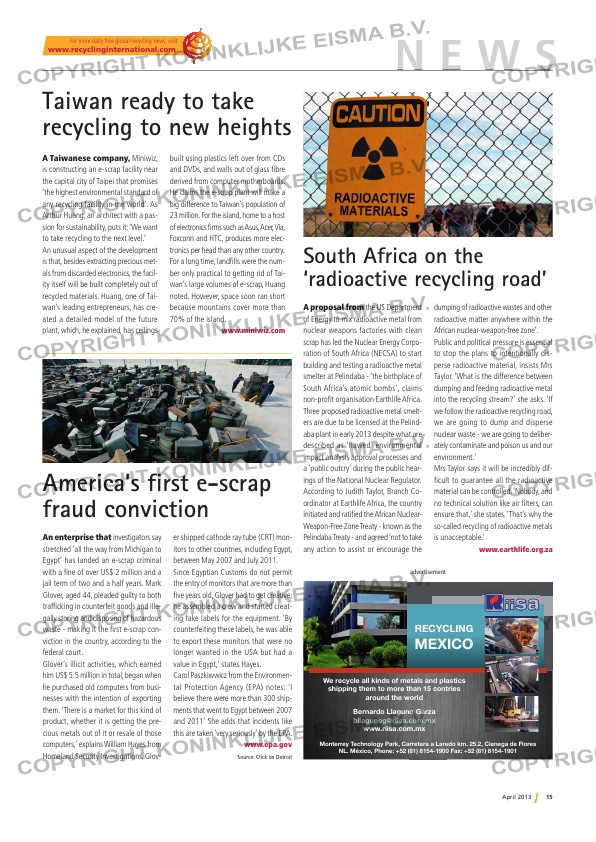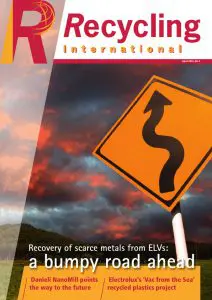Page 15 from: April 2013

N E W S
15April 2013
For more daily free global recycling news, visit
www.recyclinginternational.com
We recycle all kinds of metals and plastics
shipping them to more than 15 contries
around the world
Bernardo Llaguno Garza
[email protected]
www.riisa.com.mx
Monterrey Technology Park, Carretera a Laredo km. 25.2, Cienega de Flores
NL. México, Phone: +52 (81) 8154-1900 Fax: +52 (81) 8154-1901
RECYCLING
MEXICO
advertisement
A Taiwanese company, Miniwiz,
is constructing an e-scrap facility near
the capital city of Taipei that promises
‘the highest environmental standard of
any recycling facility in the world’. As
Arthur Huang, an architect with a pas-
sion for sustainability, puts it: ‘We want
to take recycling to the next level.’
An unusual aspect of the development
is that, besides extracting precious met-
als from discarded electronics, the facil-
ity itself will be built completely out of
recycled materials. Huang, one of Tai-
wan’s leading entrepreneurs, has cre-
ated a detailed model of the future
plant, which, he explained, has ceilings
built using plastics left over from CDs
and DVDs, and walls out of glass fi bre
derived from computer motherboards.
He claims the e-scrap plant will make a
big difference to Taiwan’s population of
23 million. For the island, home to a host
of electronics fi rms such as Asus, Acer, Via,
Foxconn and HTC, produces more elec-
tronics per head than any other country.
For a long time, landfi lls were the num-
ber only practical to getting rid of Tai-
wan’s large volumes of e-scrap, Huang
noted. However, space soon ran short
because mountains cover more than
70% of the island.
www.miniwiz.com
A proposal from the US Department
of Energy to mix radioactive metal from
nuclear weapons factories with clean
scrap has led the Nuclear Energy Corpo-
ration of South Africa (NECSA) to start
building and testing a radioactive metal
smelter at Pelindaba – ‘the birthplace of
South Africa’s atomic bombs’, claims
non-profi t organisation Earthlife Africa.
Three proposed radioactive metal smelt-
ers are due to be licensed at the Pelind-
aba plant in early 2013 despite what are
described as ‘flawed’ environmental
impact analysis approval processes and
a ‘public outcry’ during the public hear-
ings of the National Nuclear Regulator.
According to Judith Taylor, Branch Co-
ordinator at Earthlife Africa, the country
initiated and ratifi ed the African Nuclear-
Weapon-Free Zone Treaty – known as the
Pelindaba Treaty – and agreed ‘not to take
any action to assist or encourage the
dumping of radioactive wastes and other
radioactive matter anywhere within the
African nuclear-weapon-free zone’.
Public and political pressure is essential
to stop the plans to intentionally dis-
perse radioactive material, insists Mrs
Taylor. ‘What is the difference between
dumping and feeding radioactive metal
into the recycling stream?’ she asks. ‘If
we follow the radioactive recycling road,
we are going to dump and disperse
nuclear waste – we are going to deliber-
ately contaminate and poison us and our
environment.’
Mrs Taylor says it will be incredibly dif-
fi cult to guarantee all the radioactive
material can be controlled. ‘Nobody, and
no technical solution like air fi lters, can
ensure that,’ she states. ‘That’s why the
so-called recycling of radioactive metals
is unacceptable.’
www.earthlife.org.za
South Africa on the
‘radioactive recycling road’
Taiwan ready to take
recycling to new heights
An enterprise that investigators say
stretched ‘all the way from Michigan to
Egypt’ has landed an e-scrap criminal
with a fi ne of over US$ 2 million and a
jail term of two and a half years. Mark
Glover, aged 44, pleaded guilty to both
traffi cking in counterfeit goods and ille-
gally storing and disposing of hazardous
waste – making it the fi rst e-scrap con-
viction in the country, according to the
federal court.
Glover’s illicit activities, which earned
him US$ 5.5 million in total, began when
he purchased old computers from busi-
nesses with the intention of exporting
them. ‘There is a market for this kind of
product, whether it is getting the pre-
cious metals out of it or resale of those
computers,’ explains William Hayes from
Homeland Security Investigations. Glov-
er shipped cathode ray tube (CRT) mon-
itors to other countries, including Egypt,
between May 2007 and July 2011.
Since Egyptian Customs do not permit
the entry of monitors that are more than
fi ve years old, Glover had to get creative;
he assembled a crew and started creat-
ing fake labels for the equipment. ‘By
counterfeiting these labels, he was able
to export these monitors that were no
longer wanted in the USA but had a
value in Egypt,’ states Hayes.
Carol Paszkiwwicz from the Environmen-
tal Protection Agency (EPA) notes: ‘I
believe there were more than 300 ship-
ments that went to Egypt between 2007
and 2011’ She adds that incidents like
this are taken ‘very seriously’ by the EPA.
www.epa.gov
Source: Click on Detroit
America’s first e-scrap
fraud conviction
RI-3_NEWS.indd 15 08-04-13 09:22



